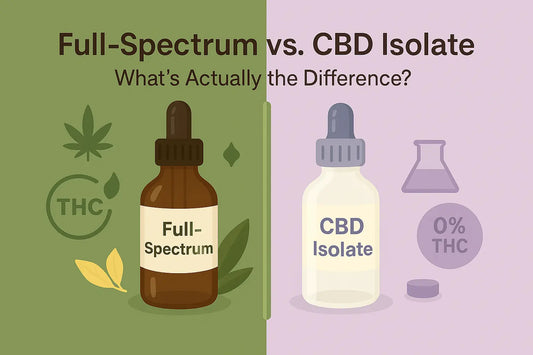
CBD Oil for Pain Relief: Can It Really Help?
Cenk CetinShare
Introduction
CBD oil has taken the wellness world by storm and is praised for its potential to ease pain naturally. From athletes recovering from intense workouts to individuals managing chronic conditions, many are turning to CBD as an alternative to traditional pain relief methods. But is it just hype, or does it really work?
With concerns over opioid dependence and the side effects of conventional painkillers, CBD has emerged as a promising option. Advocates claim it can help with everything from muscle soreness to arthritis, but what does the science actually say? In this article, we’ll dive into the research behind CBD oil’s pain-relieving properties, explore how it works in the body, and discuss whether it lives up to the buzz.
Key Takeaways
- CBD oil may help with pain by reducing inflammation and affecting pain signals.
- It interacts with the body’s ECS to regulate discomfort and promote relief.
- Early research is promising, but more studies are needed.
- Consult a doctor to find the right dose and approach.
Understanding CBD Oil
CBD, short for cannabidiol, is a natural compound found in cannabis plants. It is one of over 100 cannabinoids present in the plant, but unlike THC (tetrahydrocannabinol), CBD does not produce a psychoactive effect that causes you to feel “high.” It is popularly known for its potential therapeutic effects, including pain relief, anti-inflammatory properties, and relaxation. CBD is primarily extracted from hemp, a variety of cannabis that contains high levels of CBD and only trace amounts of THC (typically 0.3% or less in most regions). This makes it a sought-after choice for those seeking the benefits of cannabis without intoxication.
The legal status of CBD oil varies worldwide. In Thailand, CBD oil is legal but regulated under strict guidelines. The country legalized hemp-derived CBD with a THC content of no more than 0.2% for medical and wellness purposes. The Thai FDA must approve CBD products which can only be obtained from licensed sources. While personal use is allowed, advertising restrictions and import regulations remain in place. With Thailand’s cannabis laws constantly changing, consumers must stay updated on regulations to ensure they use and purchase CBD oil legally.
Mechanisms of CBD in Pain Management
CBD interacts with the body’s natural systems in several ways that may contribute to pain relief. While research is still ongoing, scientists have identified key mechanisms through which CBD may help manage pain effectively.
Interaction with the Endocannabinoid System (ECS)
The endocannabinoid system (ECS) is essential for maintaining balance in the body, including pain and inflammation regulation. CBD interacts with CB1 and CB2 receptors, which are spread across the nervous and immune systems, to influence the body's regulatory processes. By modulating ECS activity, CBD may help reduce pain sensitivity and improve the body’s ability to manage discomfort.
Potential Anti-Inflammatory Properties
Chronic pain is often linked to inflammation, whether from injuries, arthritis, or autoimmune conditions. Studies suggest that CBD may help suppress inflammatory responses by influencing immune cells and reducing the release of pro-inflammatory compounds. This anti-inflammatory effect could be a key factor in CBD’s potential for alleviating pain.
Influence on Neurotransmitters Related to Pain Perception
CBD is believed to interact with neurotransmitters such as serotonin and vanilloid receptors (TRPV1), which are involved in pain perception and mood regulation. By enhancing serotonin signaling, CBD may help improve pain tolerance, while its interaction with TRPV1 receptors may contribute to a numbing or soothing effect.
These mechanisms imply that CBD could provide a diverse approach to pain relief, positioning it as an attractive natural option for those looking to alleviate discomfort without depending on conventional painkillers. However, additional clinical research is required to gain a complete understanding of its effectiveness and the best way to use it.
Review of Scientific Evidence
Scientific research on CBD oil and its potential for pain relief is growing, with studies exploring its effects on various chronic pain conditions. While more large-scale clinical trials are needed, early findings suggest promising results for individuals suffering from inflammation-related and neuropathic pain.
Key Studies and Their Findings
- Systematic Review on CBD and Chronic Pain
A systematic review of multiple studies found that CBD may help alleviate chronic pain and inflammation in conditions such as arthritis, multiple sclerosis (MS), fibromyalgia, and neuropathic pain. Researchers note that CBD’s anti-inflammatory and neuroprotective properties contribute to its potential as a pain management option.
- CBD for Arthritis Pain
A 2020 study published in Pain examined the effects of CBD on arthritis-related pain and inflammation. Results showed that CBD application significantly reduced joint swelling and discomfort in animal models, suggesting potential benefits for human arthritis patients.
- Multiple Sclerosis and Neuropathic Pain
Research published in Frontiers in Neurology indicated that CBD might help manage pain and muscle spasticity in multiple sclerosis patients. The study suggested that CBD’s interaction with the endocannabinoid system could help reduce nerve-related pain without significant side effects.
- Fibromyalgia and CBD Use
A survey published in the Journal of Clinical Rheumatology found that many fibromyalgia patients reported improvements in pain levels and sleep quality after using CBD. While anecdotal evidence is strong, researchers emphasized the need for more controlled clinical trials to confirm its effectiveness.
These studies highlight CBD’s potential as a natural pain-relief option, particularly for chronic inflammatory and neuropathic conditions. However, experts continue to stress the importance of further clinical research to determine optimal dosages, delivery methods, and long-term effects.
Types of Pain Potentially Alleviated by CBD Oil
CBD oil has become recognized as a possible alternative for relieving different types of pain. Research suggests that it may help reduce discomfort by interacting with the body’s endocannabinoid system (ECS), influencing inflammation, nerve function, and pain perception. Below are some key pain conditions where CBD oil may offer relief:
Chronic Pain Conditions
CBD has been explored for its potential role in easing chronic pain conditions, including:
-
Arthritis: Studies suggest CBD’s anti-inflammatory effects may help reduce joint pain and stiffness.
- Fibromyalgia: Some users report decreased pain sensitivity and improved sleep with CBD use.
Neuropathic Pain
-
Neuropathic pain, typically resulting from nerve damage due to conditions like multiple sclerosis (MS) or diabetes, is often challenging to manage.
- Research indicates that CBD may help regulate nerve signaling and inflammation, offering relief from tingling, burning sensations, and nerve pain.
Inflammation Pain
-
Conditions like autoimmune disorders (e.g., lupus, inflammatory bowel disease) often cause pain due to chronic inflammation.
- CBS’s potential anti-inflammatory properties may help mitigate pain associated with excessive immune responses.
Cancer-Related Pain
- Cancer patients may experience pain due to tumors pressing on nerves or from chemotherapy side effects.
- Some studies suggest that CBD, particularly when combined with THC, may provide relief from cancer-related pain and nausea.
While promising, more clinical research is needed to fully understand CBD’s effectiveness in pain management. Individuals thinking about using CBD for pain relief should speak with a healthcare professional to find the most suitable treatment for their condition.
Ending
CBD oil is emerging as a natural option for pain relief, with potential benefits for chronic pain, inflammation, and nerve-related conditions. By interacting with the body’s endocannabinoid system and neurotransmitters, it may help reduce discomfort without the risks associated with traditional painkillers.
Although initial studies show promising results, additional research is necessary to validate its effectiveness and establish the ideal dosages. Since CBD affects individuals differently, consulting a healthcare professional is key to finding the right approach. As science continues to explore CBD’s role in pain management, it remains a hopeful alternative for those seeking relief beyond conventional treatments.









1 comment
This is a fantastic breakdown of how CBD oil targets pain through its anti-inflammatory effects and interaction with the ECS. It’s smart that you mention that CBD affects individuals differently, making the right delivery method and dosage key.
Given that, for people focused purely on relief and the full entourage effect, do you think using the raw, full-spectrum product like CBD flower is ultimately better than an oil for fast, customized results?
For anyone in the UK interested in that kind of quality, highly recommend checking out [CBD Flowers UK](https://gethemp.co.uk).